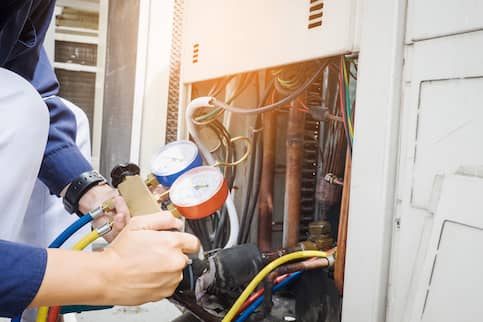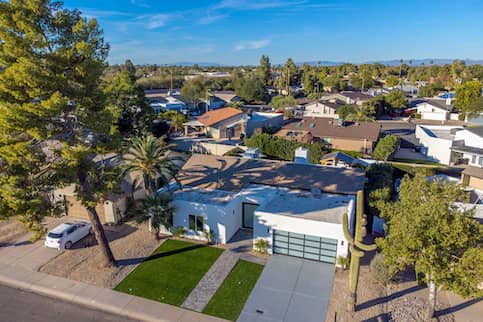When getting ready to , you’ll often deal with several moving pieces. There are many situations where ownership status for homes or businesses may come up as part of your mortgage loan transaction. Some of them are in ways you might expect, and others might be just a little more obscure. But it helps to understand the concepts, so you can prepare for any questions that might get thrown your way during the application process.
In this article, we’ll go over the various ways in which you might have ownership interest in real estate and how owning property or a business can impact your mortgage transaction.
What Is Ownership Interest In A Property?
Ownership interest in a real property refers to the rights that you have on the property as the owner, as well as the rights of any other owners invested through an ownership share. It’s important to understand that different ownership agreements establish different legal rights, regulations and restrictions for specific properties in real estate. Let’s say that you and the other owners sell the property. That means a portion of the profits made from the sale will be distributed to each owner.
Find out which loan option is right for you.
See rates, requirements and benefits.
See What You Qualify For
Buy A Home
Discover mortgage options that fit your unique financial needs.

Refinance
Refinance your mortgage to have more money for what matters.
Tap Into Equity
Use your home’s equity and unlock cash to achieve your goals.
How Ownership Interest Works In Real Estate
In real estate, ownership interest gives the property owners the right to use their property how they want. For instance, if you’re the owner, you can use it for living, renting, building or even selling it; however, when there are multiple owners of one property, everyone has to agree on how it can be used.
It’s important to understand that you can lose a property’s ownership interest through security interest. When you buy a house or any property with a mortgage loan, a lender receives a security interest, which gives them the right to take your property if you fail to meet the terms of your loan. For example, if you stop paying your mortgage, that may cause you to default, and when this happens, the lender can use the security interest to foreclose and take your property.
What Are The Types Of Ownership Interests?
There are multiple types of ownership interest in a property, such as:
- Sole ownership: This is when the sole owner or one person of the property has all of the ownership interest.
- Joint tenancy: This is when two or more people hold the title to a property. If something were to happen to one of the co-owners, the survivorship rights would go to the surviving co-owner.
- Tenancy in common: This is when two or more people have ownership of a property, but tenants in common might have unequal amounts of ownership.
- Tenancy by entirety: This is when a married couple holds equal ownership of a property.
- Owning trust: This is when a trust allows a trustee to manage the assets or change the real estate agreement with permission from the trustor.
- Owning partnership: This will enable investors to claim ownership interest in a property through a limited liability company (LLC).
How Does An Owner Receive Ownership Interest?
There are a few ways to receive ownership interest:
- You purchase a home or property
- You inherit a property
- You split a property through joint tenancy
- You make a real estate investment
Find A Mortgage Today and Lock In Your Rate!
Get matched with a lender that will work for your financial situation.
Ownership Interest With Mortgage Transactions
It’s essential to understand how your ownership interest might impact your mortgage transactions. Whether you own the title to your home, have your own business or deal with condo ownership restrictions, you should make sure you understand the aspects of ownership interest for each type of property.
Let’s take a look at some of the ways mortgage transactions come into play with ownership interest.
Being On The Title To A Home
When it comes to mortgage programs for first-time home buyers, it does matter whether you’ve had property ownership in a home before.
As many mortgage investors and grant providers define it, being a first-time home buyer means not having owned any residential property in the last 3 years prior to the closing date on your new home. You also must be purchasing a primary residence. There are very limited exceptions to this rule.
Whether you own 1% or 100% of a property, if you’ve owned it in the last 3 years, you’re often not eligible for first-time home buyer programs through the major mortgage investors. You have an interest if you own 1% or 100% of the property.
One thing to note is that if others are on the house title, they may have to sign mortgage documentation regardless of whether they’re on the loan itself.
Owning Your Own Business
Another aspect where ownership interest might come into play is if you own your own business. In fact, if you own more than 25% interest in any business, you’re considered self-employed, even if you consider the business a side gig.
If you plan to use the income from your business, the depth of documentation you must provide may depend heavily on whether you fall above or below that 25% figure.
If you have less than 25% ownership, while the documentation necessary can vary by loan type, there are some things to think about. You may provide a statement regarding the extent of your ownership of the business (e.g., Schedule K-1). It’s also a good idea to have 2 years of tax returns available with your Schedule E, which indicates other income and losses.
In addition to personal tax returns and W-2s if you have a corporation, lenders need to see your business tax returns and profit-and-loss statements, including Schedule C, Form 1120S or K-1. The exact form will vary depending on how your business is set up.
Owning A Condo
Another common issue is ownership interest within a condo project. The amenities and services offered by the condo association are a big draw. Things like an association pool or even something as simple as not dealing with exterior maintenance can help add real monetary value.
For this reason, mortgage lenders are very interested in making sure that the condo association is in good shape. This includes looking at the association’s budget when necessary and restricting how many units can be owned by a single individual or entity. This is to ensure that if a condo association loses one resident due to foreclosure or just nonpayment of dues, the loss in dues until a replacement can be found won’t doom the rest of the association and bills can still be paid.
In a condo project, single-entity ownership restrictions are as follows:
- 5 – 20 units: Ownership in not more than two units
- 20 units or more: Ownership can’t exceed 20 – 25% of the project, depending on the investor in your mortgage
The Bottom Line: It’s Important To Know Your Ownership Interest Rights As A Property Owner
Ownership interest can play a big role in many areas of a mortgage transaction, which is why a home buyer needs to understand their legal rights as a property owner.
Find A Mortgage Today and Lock In Your Rate!
Get matched with a lender that will work for your financial situation.

Victoria Araj
Victoria Araj is a Staff Writer for Rocket Companies who has held roles in mortgage banking, public relations and more in her 15-plus years of experience. She has a bachelor’s degree in journalism with an emphasis in political science from Michigan State University, and a master’s degree in public administration from the University of Michigan.












